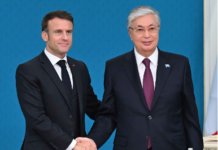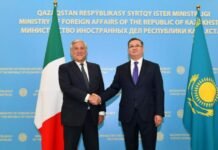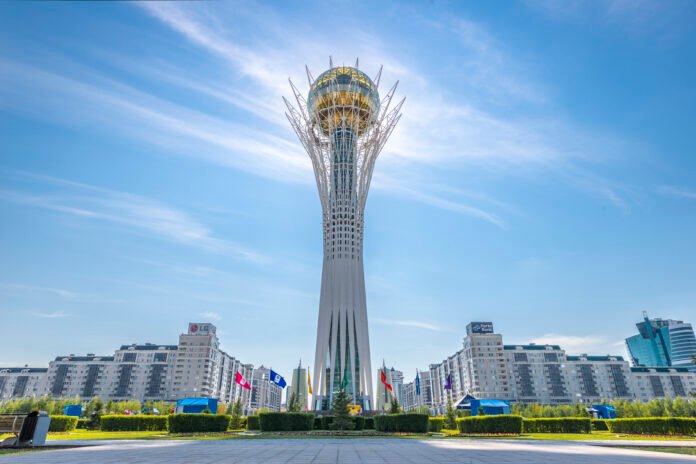A year after the tragic January events in Kazakhstan, the country’s Prosecutor General, Berik Asylov, has shared some findings from the investigation of the violent unrest. These findings reveal that the events themselves had complex origins but that the main driver of the violence was an attempt by holdovers from the Nazarbayev era to oust the elected President, Kassym-Jomart Tokayev.
The Prosecutor General’s Findings
The investigation into the events of January 2022 is being conducted in secret because of restricted information on such highly sensitive topics as foreign policy, intelligence, and counter-intelligence activities. Nevertheless, Asylov gave some significant details in a 5 January 2023 report presented to the lower house of Kazakhstan’s legislature, the Mazhilis.
Asylov explained, among other things, how an employee of the National Security Committee recruited the criminal “godfather” Arman Dzhumageldiyev, also called “Wild Arman”. According to Asylov, Wild Arman was tasked with organizing the riots, taking control of the crowd, and creating a “people’s council” that would then issue an ultimatum to the government. In this he was assisted by a local Almaty politician and by the Maskhatov criminal group, which provided arms; however, Asylov told the Mazhilis, “the people did not follow them”.
A military court is also continuing to hear the case of former defense minister, Murat Bektanov, accused of abusing power in a combat situation (Criminal Code, Article 451, Part 3). In particular, he is accused of not taking measures to restore constitutional order during the riots, especially in the main city of Almaty. According to Asylov, Bektanov’s failure allowed the rioters to succeed in breaking through the police cordon, overcoming the police and National Guard forces, and terrorizing the population.
The Failed Coup-D’etat attempt
Karim Masimov, the head of the National Security Committee at the time, was a long-entrenched technocrat from the Nazarbayev era. He appears to have regarded President Tokayev as a threat to his position and privileges and sought to hold on to power through any means necessary. He is now under arrest. The riots incited by Wild Arman seem to have been a cover for an attempted coup d’état, led by Masimov, to overthrow elected President Tokayev and seize full control of the country.
In this endeavor, Masimov and Wild Arman would have had many sympathizers amongst Nazarbayev-era holdovers. Masimov, as a central figure in diverse state agreements with international firms, also had a global network of influence. Investigative journalists have shed light on allegedly corrupt deals that were organized with Airbus and Telesonera. They have uncovered at least one suspicious company in Singapore to which he was linked. Masimov’s deep ties to former President Nazarbayev meant he was never prosecuted in Kazakhstan for his alleged corruption.
In an ironic twist, the UN Human Rights Committee criticized Kazakhstan’s government last year for Masimov’s detention. This criticism was promoted by European NGOs now at the center of the “Qatargate” corruption scandal. American lobbyist David Merkel also set up an NGO in the United Kingdom called the Alash Foundation. He widely promoted the UN report in the United States, and he continues to call for Masimov’s release.
Mainstreaming New Kazakhstan
The initial events of January 2022 represented a delayed culmination of the stagnation that had accumulated under three decades of Nazarbayev’s corrupt, oligarchic, and nepotistic rule. Tokayev’s long experience in high governmental positions gave him a unique vantage point from which to see the rot that had set in. When he took over, the country was plagued by entrenched kleptocracy and patterns of corruption facilitated by a broken legal structure.
After becoming president in 2019, Tokayev began to give the country’s civil servants opportunities to prove themselves as qualified professionals. He removed those whose only qualifications were that they were Nazarbayev loyalists. The events following the January 2022 protests have accelerated this process. To maintain momentum, Tokayev has enlisted—and continues to enlist—young professionals who will genuinely work for his project of creating a more Fair and Just Kazakhstan.
Kazakhstan’s Bolashak (“Future”) Programme has for nearly 30 years offered scholarships for the country’s citizens to attend graduate programs at the best foreign universities. In 2020, with a specific view toward improving future work in the national economy and state management, Tokayev reoriented the program in favor of more practical engineering and administrative disciplines. He is also recruiting Bolashak recipients who were excluded by the former cliquish Nazarbayev regime.
The Road Map to Modernization
A successful coup would have thwarted Tokayev’s reforms and turned Kazakhstan back into a corrupt autocracy. Cleaning out the rot to build a better foundation is a necessary but difficult task requiring persistence. The roots of the January events in Kazakhstan are complex, and international observers should not rely on stereotypes to interpret them. If they can drop their orientalist blinders, they will see that from an international as well as a domestic perspective, there is no better leadership for Kazakhstan, than Kassym-Jomart Tokayev’s route to modernization and democratization.





